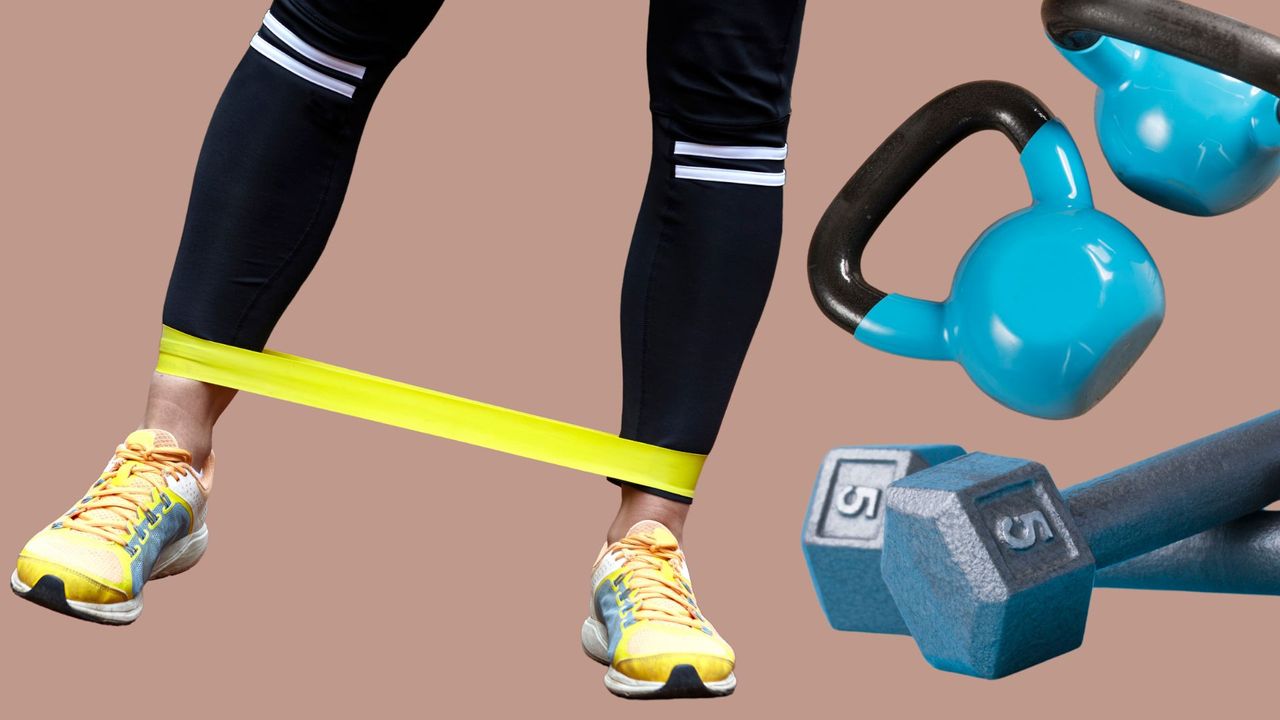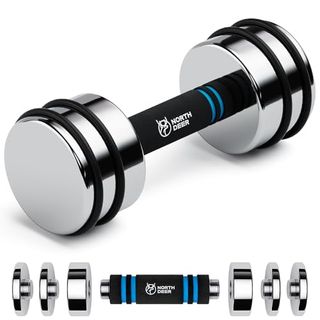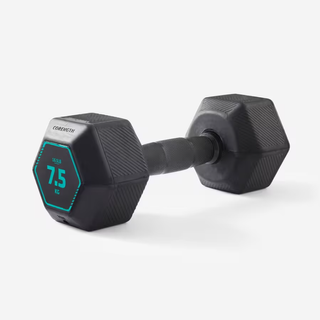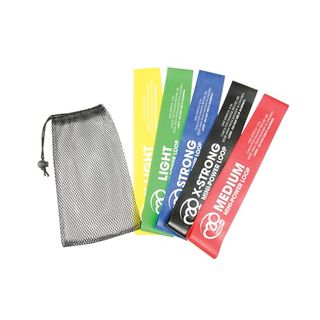Resistance bands vs weights: Which is better for building strength and mobility in home workouts?
Resistance bands are one of the most underrated pieces of home workout equipment - but can you use them to replace your dumbbells? Here's what the experts say


Resistance bands are among the most underrated pieces of home workout equipment. They are compact and offer various resistance levels, and studies show they can be game-changing when it comes to building strength, muscle, and mobility. But are they as good as weights?
Weights are a staple in any workout set-up. There's no denying that a pick of the best dumbbells or kettlebells are some of the most versatile equipment. You can do anything from a full-body workout to Pilates with them. However, they are bulkier to store and costly to buy.
So, when working out at home, which set should you choose? Dumbbells, kettlebells, or a bunch of the best resistance bands? With the help of certified personal trainers and strength specialists, we reveal all to help you decide.
Resistance bands vs weights
1. For building muscle
You'll need to do exercises that use multiple muscle groups at once (known as compound exercises) if you want to build muscle without spending hours in the gym, says Charlotte Dunnell, a certified personal trainer and strength training specialist. "These exercises are typically performed more easily using dumbbells than resistance bands."
She says: "Using dumbbells will allow you to load exercises in a greater variety of ways than resistance bands, and you will be able to perform far more movement patterns."
For example, if you're looking to build muscle in the lower body, a deadlift is a great exercise in a dumbell gym workout. It's doable with resistance bands but much easier to do with weights.
Winner: Dumbbells
Sign up for the woman&home newsletter
Sign up to our free daily email for the latest royal and entertainment news, interesting opinion, expert advice on styling and beauty trends, and no-nonsense guides to the health and wellness questions you want answered.
2. For weight loss and 'toning'
Many studies have looked at the effectiveness of strength training for weight loss - and they all mostly say the same thing. Lifting weights can help boost your metabolism, build lean muscle mass, and help burn calories (even at rest), making it one of the ideal exercises for weight loss. 'Toning' is just another way to say building muscle and losing fat.
When combined with a healthy balanced diet in a calorie deficit, you'll see more results.
The studies (apart from one by Beijing Sport University) don't really specify which type of resistance is best, though most agree that you should use resistance bands or weights rather than bodyweight exercises, and all say that you need to do it regularly and make it harder over time to see changes.
So, in the resistance bands vs weights debate, choose the resistance that fits most easily into your lifestyle, home, and daily routine. Consistency is key.
Winner: Tied - choose the one most convenient for you
3. For improving strength
If you're looking to get stronger, dumbbells just about have the edge over resistance bands, says Dunnell. "Dumbbells make it easier to track progress, as you can gradually increase the weight, allowing for consistent progression. They also offer greater versatility, enabling you to perform a wider range of exercises across all muscle groups," she explains.
"While resistance bands can be effective, it can be more difficult to progress exercises using bands, and they simply aren’t as versatile."
Resistance bands come in different resistances - and you can get some very 'heavy' ones - but these tend to be very short and thick. To use weights effectively, you need to use a full range of motion, and these bands are unlikely to let you do that.
That being said, while you'll need weights for a dumbbell core workout or doing weighted Pilates, the PT notes that resistance bands might be a better option if you're looking to improve strength in certain areas - like the hip abductors (small muscles on the outside of the hips and upper thighs.
"I think there's definitely a place for both when strength training, but if I had to choose, I would choose dumbbells."
Winner: Dumbbells

If you're leaning towards dumbbells but worried about space to store them, an adjustable pair can help with that as they have plates you take on and off to increase or decrease the resistance. It's still not as space-friendly as resistance bands - and they certainly cost more - but it's something to consider.

A hexagonal set is my recommendation for simple dumbbells in various resistances. These don't roll away when you put them down on the floor and can also be used for core exercises at home, like renegade rows.
4. For mobility and flexibility
Resistance bands were invented as rehabilitation tools, so it makes sense they'd be the better choice for mobility exercises and stretching as they offer a controlled resistance throughout the range of movement.
For example, if you bring a band back and forth over your head from your chest to your upper back, the band stays under tension as you pull it the entire time, helping you to stretch your shoulder and chest muscles. If you were to do this with dumbbells, you'd lose control once they passed behind your head, increasing the risk of injury.
Studies published in the Journal of Physical Therapy Science also show they are particularly useful for older people and anyone who might struggle with the impact of free weights like dumbbells, kettlebells, and barbells.
5. For home workouts
Choosing resistance bands vs weights for home workouts may also come down to storage and space if you're strength training at home. Undoubtedly, a full-body resistance band workout is the easier option. As they are simple reinforced elastic bands, you can fold them away into a small pouch (that often comes with them) and tuck them away in a drawer.
For the same reason, they are easier to take abroad in your suitcase and use on holiday.
Weights, like dumbbells and kettlebells, need more storage space. Most people either leave them out as part of the furniture or tuck them away under sofas, coffee tables, or beds - but you'll need the space to do that.
Winner: It depends on storage. If you have a small space, resistance bands will be better.
6. For beginners
We focus on making exercises harder to improve strength, but if you're doing strength training at home for beginners, you may need to make the exercises easier to build up your fitness. Resistance bands are better for this, as you can change the resistance by stretching the band more or less, depending on what you need. You have more control. With dumbbells, you're forced to go down a weight to make the exercise easier.
As a beginner, you're also less likely to need the super thick resistance bands that limit your range of motion.
They are also much cheaper than dumbbells, making them a good starting point for building a home gym.
However, free weights like dumbells, kettlebells, barbells, and a pick of the best weighted vests have merits for beginners too. You can buy them in weights from 0.5kg to 30kg and up, and they are great for improving stability, balance, and coordination with muscle and strength, just like resistance bands.
Winner: Resistance bands - but it's mostly down to preference.
Are resistance bands as good as weights?
Overall, dumbbells will be better than resistance bands for getting stronger, building muscle, and generally working out from home over the long term. "They provide greater versatility, and if you invest in adjustable dumbbells, you can easily perform a wide range of exercises for the upper and lower body with varying resistance levels," says Dunnell.
"While resistance bands are useful for certain movements, in my opinion, dumbbells allow for more diverse training, and it's easier to achieve progressive overload, making them a better option for most home workouts," she says.
Progressive overload is when you make exercises harder over time by increasing the weight or the number of repetitions to challenge the muscles in a new way. This is needed to get stronger.
In some situations, you might find resistance bands easier. For example, if you're on holiday, have little storage space, or limited budget to spend on home workout equipment. They can also be more useful for some exercises that target smaller muscles in the body.
So, ultimately, the ideal situation is to have both weights and resistance bands in your home workout collection. If you have to choose one or the other, it comes down to your personal situation and preference.

Grace Walsh is woman&home's Health Channel Editor, working across the areas of fitness, nutrition, sleep, mental health, relationships, and sex. She is also a qualified fitness instructor. In 2025, she will be taking on her third marathon in Brighton, completing her first ultra marathon, and qualifying as a certified personal trainer and nutrition coach.
A digital journalist with over seven years experience as a writer and editor for UK publications, Grace has covered (almost) everything in the world of health and wellbeing with bylines in Cosmopolitan, Red, The i Paper, GoodtoKnow, and more.
-
 Smeg has turned the humble kettle into a nostalgic style statement - why every home needs one
Smeg has turned the humble kettle into a nostalgic style statement - why every home needs oneSmeg's Retro Whistling Kettle is an elevated, stylish take on the humble kitchen essential. It's beautiful, bold, and at the top of my wish list
By Laura Honey Published
-
 Monty Don's 'genius' planting trick gives outdoor plants the best chance of thriving
Monty Don's 'genius' planting trick gives outdoor plants the best chance of thrivingThis mess-free trick will make planting seamless - and give your plant a great headstart
By Emily Smith Published
